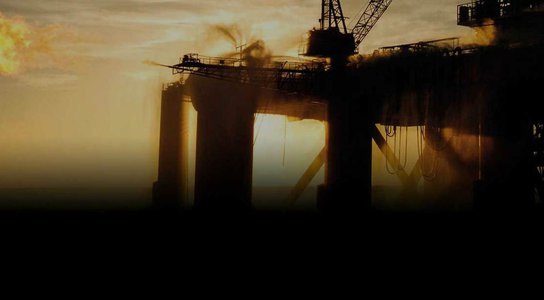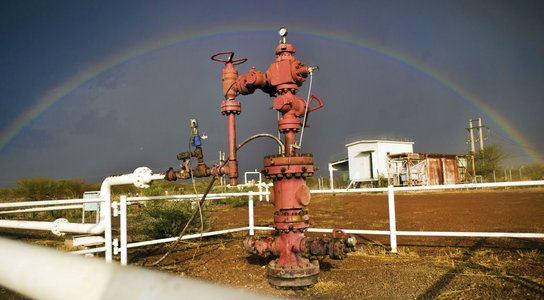A public debate over the economic, environmental and social benefits of oil extraction in the UK is needed long before the value of potential new discoveries can be judged, warned Global Witness as UK Oil and Gas Investments (UKOG) announced a “world class potential” find near Gatwick Airport.
UKOG said its analysis suggested yields of up to 158 million barrels of oil per square mile, in an area covering 55 square miles spanning Kent, Sussex, Surrey and Hampshire. Given the stated need to drill further appraisal wells, it appears to have speculated upon the size of its find by suggesting this volume of oil is likely across its entire concession.
“The public badly needs to know what’s at stake before we go any further, and before speculation gets too politicised as we saw during the Scottish referendum debate” said Brendan O’Donnell, Oil Team leader at Global Witness. “In too many countries, lack of debate, transparency or planning in the rush to extract oil means habitats get wrecked, revenues are poorly invested and benefits do not reach the citizens the oil belongs to. That could happen here. We need clear information about whether it is wise to extract this oil at all and who is likely to profit. Then we need a full and frank public conversation about whether we want to proceed and if so how the money would be used.”
“It’s far too early to talk about potential economic returns – we don’t know if extracting the oil is either viable or desirable,” said O’Donnell. “An unparalleled scientific consensus that says that most of the world's known fossil fuel reserves have to stay in the ground to stand a reasonable chance of avoiding catastrophic rises in global temperatures. We can’t commit to capping carbon emissions whilst simultaneously rushing to extract oil that would accelerate climate change when burnt.
The discovery comes as the UK is deciding measures to ensure the public know who is buying up British oil and gas. As a member of the international Extractive Industry Transparency Initiative (EITI), the government along with companies and citizens groups is weighing up whether private companies that operate oil and gas projects in the UK should have to declare who their real owners are. This would help avoid vested interests at home and abroad standing to profit from state resources by hiding their ownership of companies.
A You Gov poll commissioned by Global Witness recently showed that while only 55 per cent of British adults were aware that oil and gas discovered in the UK is the property of the state, 84 per cent agreed that politicians should have to declare whether they currently own companies that extract UK oil and gas. 75 per cent agreed that close family members of UK politicians should have to declare their ownership, while 77 per cent agreed that foreign politicians should have to do so (1). Global Witness believes that any such ‘politically exposed person’ (2) should have to declare such an interest regardless of the size of their share in a private company extracting public assets.
The global movement to end the financial secrecy that has long blighted the oil sector and kept citizens in resource-rich countries poor is gathering momentum. In December the UK government implemented effective laws requiring companies listed here to publish the payments they make to all governments in return for oil contracts.
Similar laws have been passed across the EU and in the US in recent years, helping citizens in oil rich countries to better assess how their oil money is spent, and who stands to benefit. But big oil companies have been fighting to keep their deals with governments secret by attempting to weaken the transparency laws or their implementation. A row recently broke out between UK extractives companies and campaigning organisations after industry bodies drafted voluntary guidelines for implementing the UK law that encourage companies to continue hiding certain payments.
“We commend the UK government for creating a strong transparency standard. Any new government must face down industry attempts to cover up any payments,” said O’Donnell.
/ ENDS
Contacts
-
Oliver Courtney
Notes to editor:
Notes:
(1) March 2015 YouGov poll commissioned by Global Witness
(2) A “politically exposed person" is a defined as a current or former senior official in the executive, legislative, administrative, military, or judicial branch of a foreign government (elected or not) a senior official of a major foreign political party a senior executive of a foreign government-owned commercial enterprise, being a corporation, business or other entity formed by or for the benefit of any such individual an immediate family member of such individual; meaning spouse, parents, siblings, children, and spouse's parents or siblings any individual publicly known (or actually known by the relevant financial institution) to be a close personal or professional associate. For more, seehttp://data.consilium.europa.eu/doc/document/ST-5116-2015-ADD-2/en/pdf, page 32.
You might also like
-
Campaign Oil, gas and mining transparency
Corruption and fraud in the oil, gas and mining industries props up brutal regimes and lines the pockets of kleptocrats. Companies and governments must end the secrecy and bring deals and profits into the open
-
Briefing Revenue disclosure laws – Cardin-Lugar and the global transparency standard
Global movement to end the corruption that blights resource-rich countries is gathering pace.